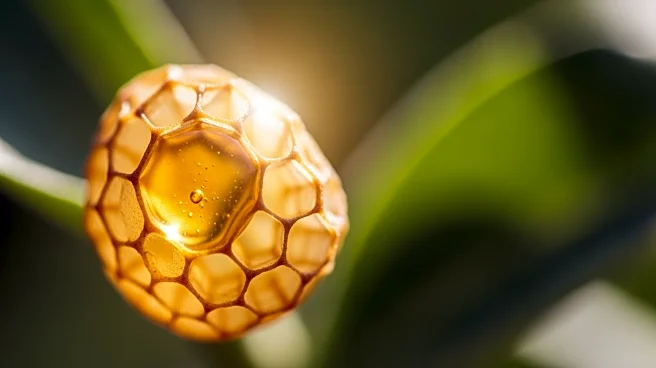What's Happening?
Recent research from the University of British Columbia has highlighted the impact of viral infections on honey bee queens, leading to significant changes in bee colony leadership. The study, published in the Proceedings of the National Academy of Sciences,
found that common viral infections cause physical deterioration in queen bees, notably shrinking their ovaries and reducing their egg-laying capacity. This decline also affects the production of methyl oleate, a pheromone essential for signaling the queen's fitness to worker bees. As the pheromone levels drop, worker bees initiate the process of replacing the queen, known as supersedure. This internal shift can affect the health of managed hives and the agricultural systems reliant on them.
Why It's Important?
The health of honey bee queens is crucial for pollinating approximately one-third of global crops, making their well-being directly linked to food security worldwide. Beekeepers have expressed concerns over queen failures and early supersedure, with surveys indicating 'poor queens' as a leading cause of overwintering losses. Viral infections disrupt pheromone communication, critical for hive stability. The study suggests that supplementing colonies with synthetic pheromone blends containing methyl oleate could reduce the likelihood of queen replacement, offering a potential solution for beekeepers to stabilize hives during production periods. Additionally, the research underscores the importance of managing varroa mite populations, which act as vectors for viruses detrimental to queen health.
What's Next?
The study advocates for a proactive approach to managing varroa mite populations to enhance queen health and colony stability. While there is currently no treatment for viruses within honey bee colonies, the findings empower beekeepers to rethink management strategies concerning varroa mites. This could ultimately benefit queen longevity and colony health, ensuring the stability of pollination services vital for agriculture. Further research and field trials may explore the effectiveness of synthetic pheromone blends in preventing queen replacements and maintaining hive stability.
Beyond the Headlines
The study not only sheds light on the intricate dynamics within honey bee colonies but also highlights their larger implications for agriculture and food systems worldwide. Addressing the health of these essential pollinators is more vital than ever in ensuring global food security. The research emphasizes the need for innovative solutions to protect queen bees from viral infections and varroa mites, which could have long-term benefits for agricultural productivity and sustainability.
















